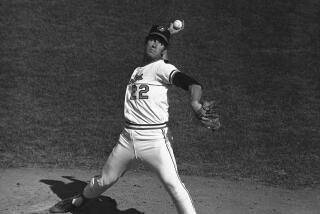The Fun Has Only Begun for Ripken
- Share via
BALTIMORE — It’s still early, but Cal Ripken doesn’t seem too beaten down by his pursuit of Sachio Kinugasa’s world record for consecutive games played.
Two hits in the opener, two more Wednesday night, the game-tying double in Thursday’s come-from-behind, 5-3 victory over Kansas City.
Imagine how Ripken will erupt if he ties Kinugasa’s record of 2,215 consecutive games on June 12, and breaks it June 13.
The Orioles are 3-0 for the first time since 1985, so we can afford to look ahead, even if Ripken refuses to watch “Pride of the Hiroshima Carp.”
Seriously, with all due respect to the Iron Man of Japan, the pressure is off Ripken, at least in the Western Hemisphere.
That’s the simple explanation for Ripken’s hot start. Yet, it’s not the biggest reason his brother, Bill, said, “He’s having more fun than I think he’s had in a long time.”
Oh, Ripken is relieved his chase of Lou Gehrig is over. But to hear him tell it, he’s even more relieved that Roberto Alomar is at second base and B.J. Surhoff at third.
It’s not the streak, it’s the stability.
One has been an issue nearly as long as the other.
“This is not a knock on anybody, but since I’ve been the shortstop, Billy is the only second baseman I had for any length of time,” Ripken said Thursday.
“You see the numbers on the scoreboard--’Cal has played with so many different second baseman, so many different third baseman.’ You invest your time and energy, trying to be the best you think you can be.
“But just think about Lou Whitaker and Alan Trammell all those years. They’ve been able to come into spring training and build on what they had.”
With Alomar--and to a lesser extent, Surhoff--Ripken can now do the same. No more Bret Barberie and Manny Alexander at second. No more Leo Gomez and Jeff Manto at third.
For the record, Alomar is the Orioles’ 23rd starting second baseman since Ripken took over at shortstop on July 1, 1982. Surhoff is the 35th to start at third.
“He was always having to look on both sides of him, always wondering who was where,” Orioles catcher Chris Hoiles said. “That takes a lot out of you during the course of a game.
“He doesn’t have to do that now. He knows where Robby plays. He know where B.J. plays. He can go out and play the game. He doesn’t have to baby-sit and position everybody.”
Surhoff hadn’t played third since 1994, but he’s a terrific athlete with better range than most of the Orioles’ recent third basemen. Alomar is the club’s best clutch hitter since Eddie Murray, and the best second baseman in the world.
The new backup second baseman, meanwhile, might be the player Ripken trusts most--his brother, Bill. Their lockers are next to each other in the Orioles’ clubhouse. Bill isn’t going to play much, but his mere presence is comforting to Cal.
As Ripken himself put it, “There’s a lot to be happy about.” In leaner times, he was the Orioles’ most feared hitter. Now he’s batting behind Alomar, Rafael Palmeiro and Bobby Bonilla, and ahead of Surhoff and Hoiles.
That means Ripken will get better pitches to hit. He could be headed for his fifth .300 season, and third in the past six. Already, he’s four for four with runners in scoring position.
Still, it’s the infield defense that seems to have Ripken most excited. In their three-game sweep of Kansas City, the Orioles turned five double plays and did not commit an error.
“B.J. and Robby couldn’t be more receptive to what’s going on,” Ripken said. “We all seem to be clicking really well. It seems like we’re a real unit.”
Amazing what a team can accomplish with a full spring training at one home base. Last season, Ripken cited the shortened spring as a reason the Orioles failed to mesh. This year, they had just as many new players, but more time.
They still traveled more than most clubs, but for the first time in six years, they were based in one city--Fort Lauderdale, Fla. “We spent a lot more time talking about things,” Ripken said--talking, and learning about each other.
The focus now is on the team, and Ripken said that is his preference. No one will ever know if his consecutive-games streak detracted from his play in a particular season, or his career. But suffice it to say, it’s easier for him now.
“Last year had to take its toll on him,” Oriole Manager Davey Johnson said. “He said he enjoyed it. But that’s such an enormous record he broke. His concentration at home plate probably suffered from it.”
Bill Ripken said: “It has to be an awful lot off his mind, as far as the demands on him. I don’t think it’s much of a story. The record has been tied, the record has been broken. He can go out and play for another 10 years. Who cares?”
So, forget 2,131, the number that motivates Ripken now is 1983. That’s the last time the Orioles reached the postseason, and the only time Ripken made it. With this team, all things are possible. With this infield, especially.
It’s not the streak, it’s the stability.
A stability he has never had.
“There are no guarantees, but what that ultimately means is you have the ability to win close games, have a chance to take it to the next level,” Ripken said.
“That’s what we’re all play for. It’s been so long since I’ve done it. You know how special that is. You’re even hungrier to get back.”
More to Read
Go beyond the scoreboard
Get the latest on L.A.'s teams in the daily Sports Report newsletter.
You may occasionally receive promotional content from the Los Angeles Times.









